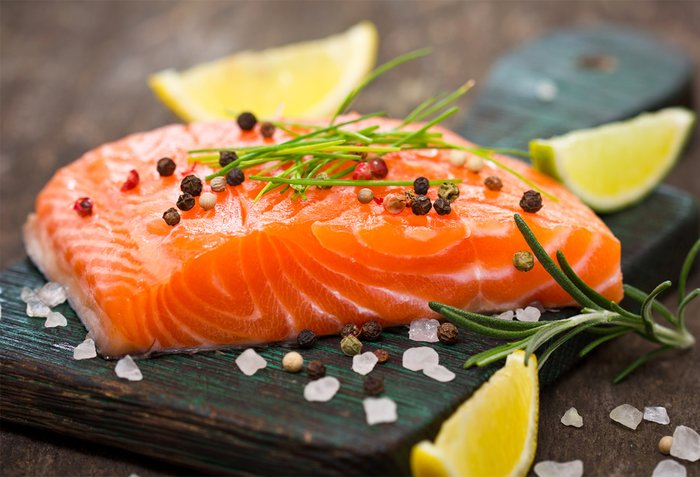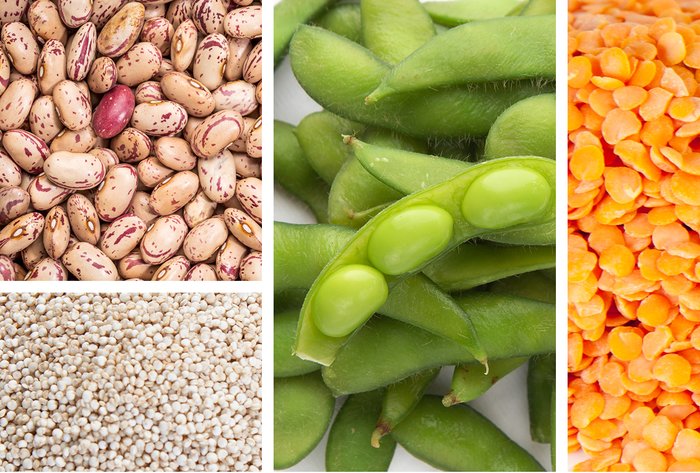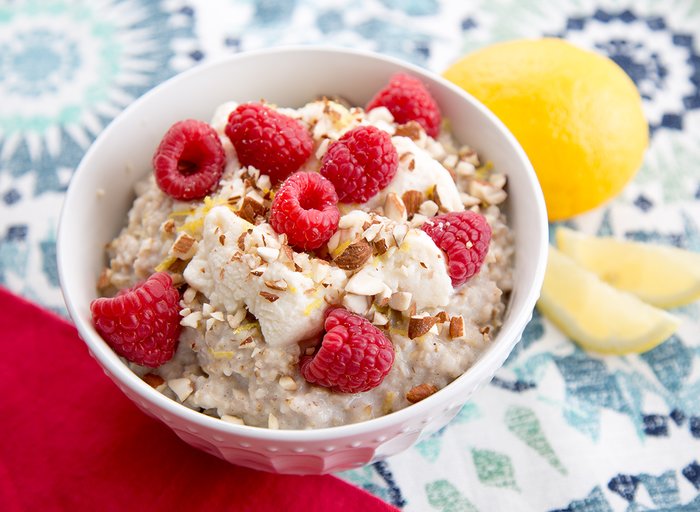It's the time of year when millions of people start laying plans to make the coming year a little healthier, to change their habits so they have a little more muscle and a little less fat. For those so inclined, there's no shortage of talking heads ready to have you gulping down charcoal-laced smoothies and spiralizing every zucchini in sight—all guaranteed to whip your physique into shape.
These trends all have their strong points, but you're better off focusing on sustainable and research-backed eating practices. Kick-start a year of awesome eating with these easy-to-implement strategies—no vanilla bone broth cleanses required—and set yourself up for long-lasting success!
1. Reel in Your Protein
The Chinese zodiac may proclaim 2018 the Year of the Dog, but for the sake of your health and fitness gains, I suggest you instead think of it as the "Year of the Fish." On average, Americans eat only about half the amount of fish the American Heart Association recommends, and as many as 99 percent may not get enough omega-3 fatty acids in our diets.[1]

Omega-3s have been linked to improvements in everything from heart to bone to brain health. A study in The Journal of Sports Science & Medicine found that people with a more omega-3s in their tissue experienced less muscle pain after a bout of resistance training.[2]
After entering muscle cells, these mega-healthy fats may work to lessen the damage inflicted by heaving around the iron. If you're not a big fish fan, get up close and personal with fish oil. You'll get the same nutrients without the taste.
2. Seek Out Plant Protein
A substantial amount of research shows it's a good idea to set a New Year's resolution to get more protein from plants and less from animals. After adjusting for lifestyle and dietary risk factors, a major study involving 131,342 participants found that for every 3-percent increase in plant protein the participants worked into their diets, they saw their risk for death from causes including heart disease drop by 10 percent over a 32-year period.[3]
If that isn't proof enough for you, consider this: Consuming 375-500 grams of fruit, vegetables, and legumes each day (a medium apple is about 180 grams) was found to lower the incidence of cardiovascular disease in a wide range of populations.[4] I'm just saying, an apple a day…

When you include more plant-based foods like beans, leafy greens, nuts, and tofu in your diet, you also get more fiber, vitamins, minerals, good-for-you fats, and antioxidants—all of which have significant immune-supporting and fat-fighting powers. But, wait, there's more: When you get more of your protein from plants, you tend to consume a greater diversity of foods, which can translate into better overall nutrition.[5]
3. Front Load Your Calories
Make 2018 the year when you "eat breakfast like a king, lunch like a prince, and dinner like a pauper." Mounting research suggests that getting more calories earlier in the day can help trim your belly. A 2017 study, among others, found that people who consumed more calories at breakfast and lunch had, on average, a lower body mass index (BMI) compared to people who ate their biggest meal of the day at dinner.[6,7,8]
Why is this? For one, front-loading calories could help bolster satiety, lessen cravings for junk food as the day progresses, improve metabolic measures like insulin sensitivity, and take advantage of the fact that humans tend to have a higher metabolism earlier in the day. Other research suggests that eating later in the day can pack on unwanted body fat.[10]

The upshot is that 2018 might be the year to start your day with good, solid meals with lots of whole grains, smart proteins like eggs, and healthy fats such as nuts and seeds.
4. Put Your Mind to It
At the risk of getting too zen on you, I'd like to suggest you practice the skill of mindful eating in the new year. Busy as we are, we tend to inhale food with little thought to what we're eating. This can lead to eating too much food without realizing it, as well as to poor digestion.

Studies show that people who act as if they're in a speed-eating contest tend to consume more calories, experience greater hunger after a meal, and are more likely to have extra pounds to work off.[10,11,12]
Mindful eating, on the other hand, can not only make food taste better, but can give you time to take note of hunger cues so you're less likely to eat beyond satiety. Taking the time to appreciate each bite can reduce destructive food behaviors such as emotional and stress-related eating, which can lead to poor food choices and weight gain.[13,14,15]

References
- Thuppal, S. V., von Schacky, C., Harris, W. S., Sherif, K. D., Denby, N., Steinbaum, S. R., ... & Bailey, R. L. (2017). Discrepancy between Knowledge and Perceptions of Dietary Omega-3 Fatty Acid Intake Compared with the Omega-3 Index. Nutrients, 9(9), 930.
- Lembke, P., Capodice, J., Hebert, K., & Swenson, T. (2014). Influence of omega-3 (n3) index on performance and wellbeing in young adults after heavy eccentric exercise. Journal of Sports Science & Medicine, 13(1), 151.
- Wise, J. (2016). Eating more plant protein is associated with lower risk of death. BMJ: British Medical Journal (Online), 354.
- Miller, V., Mente, A., Dehghan, M., Rangarajan, S., Zhang, X., Swaminathan, S., ... & Bangdiwala, S. I. (2017). Fruit, vegetable, and legume intake, and cardiovascular disease and deaths in 18 countries (PURE): a prospective cohort study. The Lancet, 390(10107), 2037-2049.
- Bianchi, C. M., Egnell, M., Huneau, J. F., & Mariotti, F. (2016). Plant protein intake and dietary diversity are independently associated with nutrient adequacy in French adults. The Journal of Nutrition, 146(11), 2351-2360.
- Kahleova, H., Lloren, J. I., Mashchak, A., Hill, M., & Fraser, G. E. (2017). Meal Frequency and Timing Are Associated with Changes in Body Mass Index in Adventist Health Study 2. The Journal of Nutrition, 147(9), 1722-1728.
- Madjd, A., Taylor, M. A., Delavari, A., Malekzadeh, R., Macdonald, I. A., & Farshchi, H. R. (2016). Beneficial effect of high energy intake at lunch rather than dinner on weight loss in healthy obese women in a weight-loss program: a randomized clinical trial. The American Journal of Clinical Nutrition, 104(4), 982-989.
- Bo, S., Musso, G., Beccuti, G., Fadda, M., Fedele, D., Gambino, R., ... & Cassader, M. (2014). Consuming more of daily caloric intake at dinner predisposes to obesity. A 6-year population-based prospective cohort study. PloS One, 9(9), e108467.
- McHill, A. W., Phillips, A. J., Czeisler, C. A., Keating, L., Yee, K., Barger, L. K., ... & Klerman, E. B. (2017). Later circadian timing of food intake is associated with increased body fat. The American Journal of Clinical Nutrition, 106(5), 1213-1219.
- Maruyama, K., Sato, S., Ohira, T., Maeda, K., Noda, H., Kubota, Y., ... & Imano, H. (2008). The joint impact on being overweight of self reported behaviours of eating quickly and eating until full: cross sectional survey. BMJ, 337, a2002.
- Shah, M., Copeland, J., Dart, L., Adams-Huet, B., James, A., & Rhea, D. (2014). Slower eating speed lowers energy intake in normal-weight but not overweight/obese subjects. Journal of the Academy of Nutrition and Dietetics, 114(3), 393-402.
- Andrade, A. M., Greene, G. W., & Melanson, K. J. (2008). Eating slowly led to decreases in energy intake within meals in healthy women. Journal of the American Dietetic Association, 108(7), 1186-1191.
- Carrière, K., Khoury, B., Günak, M. M., & Knäuper, B. (2017). Mindfulness-based interventions for weight loss: a systematic review and meta‐analysis. Obesity Reviews.
- O'Reilly, G. A., Cook, L., Spruijt‐Metz, D., & Black, D. S. (2014). Mindfulness-based interventions for obesity‐related eating behaviours: a literature review. Obesity Reviews, 15(6), 453-461.
- Dalen, J., Smith, B. W., Shelley, B. M., Sloan, A. L., Leahigh, L., & Begay, D. (2010). Pilot study: Mindful Eating and Living (MEAL): weight, eating behavior, and psychological outcomes associated with a mindfulness-based intervention for people with obesity. Complementary Therapies in Medicine, 18(6), 260-264.

